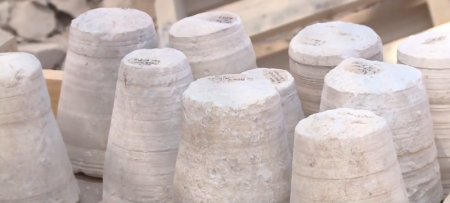Archaeology Discovery: Mug Workshop Found Near Where Jesus Turned Water Into Wine

Archaeologists have discovered an ancient mug workshop that would have been located near the town of Cana, where Jesus performed the miracle of turning water into wine.
Archaeologist Yonatan Adler and his team recently found the mug workshop near Reineh in modern day Israel, according to AFP.
"Adler and his team have uncovered fragments of chalkstone mugs and bowls along with thousands of cylindrical chalk cores discarded in the process of hollowing out the vessels with a lathe," reported AFP.
"They are typical of a period from the second half of the first century BC to the middle of the first century AD. Jews of the period used stoneware for reasons of religious observance, Adler said."
Described in John 2:1–12, at a wedding feast in the town of Cana, Jesus performed his first miracle, which was the changing of water into wine.
Included in John's account was a mention of six large stone water jars, which were used for Jewish purification rites.
In an interview with AFP, Adler noted that thus far "we haven't found production of these large jars" at the Reineh site.
"But presumably the stone jars that would have been used at Cana would have been produced at a site like this, probably in the area," Adler explained.
"What's exciting here is that for the first time we have physical evidence of production of stone vessels here in Galilee."
This is not the first discovery of a site connected to the New Testament that has garnered headlines this year. Earlier this month, another group of researchers announced that they might've discovered the home of three of Jesus' disciples.
Earlier this month, researchers from Kinneret College said they believe they've found the Roman city of Julias, which was built as part of the town of Bethsaida, which is identified in John 1:44 as the hometown of Philip, Andrew, and Peter.
"A multi-layered site discovered on the northern shore of the Sea of Galilee, in the Bethsaida Valley Nature Reserve, is the spot, the team believes," reported Haaretz.
"The key discovery is of an advanced Roman-style bathhouse. That in and of itself indicates that there had been a city there, not just a fishing village ..."





















